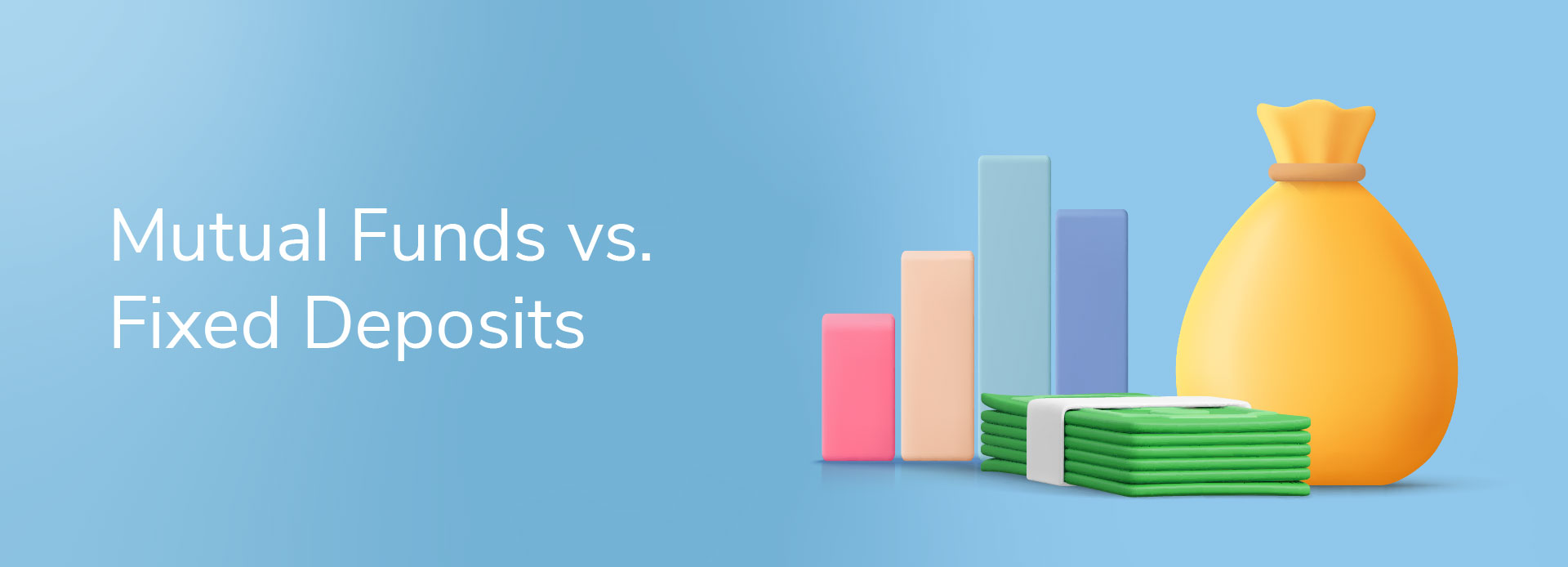
Fixed Deposit vs Mutual Fund
06 May 2024 | By INDIE
In the world of money matters, almost every individual feels like standing at a crossroads with different paths. Right there, you see two big options: mutual funds and fixed deposits.
You can think of mutual funds and fixed deposits as two roads leading to your financial goals. Each road has its own twists and turns, offering different benefits and risks. Comparing mutual funds vs. FD might seem like solving a puzzle. In this blog post, we're going to. We'll explore what makes each option unique and what benefits they offer.
What are Mutual funds?
Mutual funds are collective investment vehicles pooling money from investors to invest in a diversified portfolio of stocks, bonds, or other securities. Professional fund managers have the responsibility to manage these funds and make investment decisions on behalf of the investors.
Here are some of the key features of mutual funds:
● Diversification
Your money will be spread across various assets, reducing the risk associated with investing in individual securities.
● Professional Management
Skilled fund managers oversee the investment decisions, aiming to achieve optimal returns for all investors.
● Liquidity
You can typically buy mutual fund units at the fund's net asset value (NAV) on any business day. In terms of mutual fund vs. fixed deposit comparison, this liquidity angle forms a striking difference.
● Accessibility
Mutual fund schemes also offer access to various asset classes and investment strategies, catering to different risk profiles and investment objectives.
● Transparency
Fund managers disclose information about the fund's holdings, performance, and expenses regularly, ensuring transparency about your investments (whether one-time or SIP).
● Affordability
You can start investing in mutual funds with relatively small amounts. The low threshold criterion makes them accessible to a wide range of investors.
What are Fixed Deposits?
Fixed Deposits, commonly known as FDs, are a popular investment option banks and financial institutions offer. They involve depositing a specific amount of money with a bank or financial institution for a predetermined period, known as the FD tenure. During this period, the deposited amount earns interest based on FD rates agreed upon at the time of opening the FD.
Some of the key features of Fixed Deposits are as follows:
● Fixed returns
As a part of mutual funds vs. FD comparison based on returns, FDs offer interest at fixed FD rates throughout the tenure, thereby providing you with predictable returns.
● Term flexibility
You can choose the tenure of your FDs, ranging from a few months to several years, based on your goals and liquidity requirements.
● Low Risk
If you want to select between FD or mutual fund based on risk involved, you can consider FDs to be low-risk investments as they are typically backed by government guarantees or bank assurances.
● No Market Fluctuations
Unlike investments in stocks or mutual funds, the returns from Fixed Deposits are not subject to market fluctuations, providing stability to investors.
● Interest Payment Options
You can also opt for periodic interest payouts (monthly, quarterly, or annually) or choose to reinvest the interest earned to enhance the overall returns.
Recommended Read: How to enhance liquidity in FDs?
Mutual Funds vs. FD: Comprehensive Comparison
Criterion |
Mutual Funds |
Fixed Deposits |
Type of Investment |
Pooling of funds from multiple investors |
Individual deposits with banks or institutions |
Investment Objective |
Potential for capital appreciation and growth |
Capital preservation and fixed returns |
Risk Level |
Moderate to High |
Low |
Returns |
Varies based on market performance |
Fixed, predetermined rate of interest |
Liquidity |
Generally high; units can be bought/sold daily |
Limited; withdrawals may incur penalties |
Diversification |
Offers diversification across various assets |
Limited diversification; focused on fixed income |
Investment Tenure |
Can vary from short to long term |
Predetermined duration |
Tax Implications |
Tax-efficient options available |
Interest income subject to tax |
Regulatory Oversight |
Regulated by Securities and Exchange Board of India (SEBI) |
Regulated by banking authorities |
Thinking of selecting FD over mutual funds? Start an INDIE Fixed Deposit today!
Disclaimer: The information provided in this article is generic and for informational purposes only. It is not a substitute for specific advice in your circumstances. Hence, you are advised to consult your financial advisor before making any financial decision. IndusInd Bank Limited (IBL) does not influence the views of the author in any way. IBL and the author shall not be responsible for any direct/indirect loss or liability incurred by the reader for making any financial decisions based on the contents and information.




